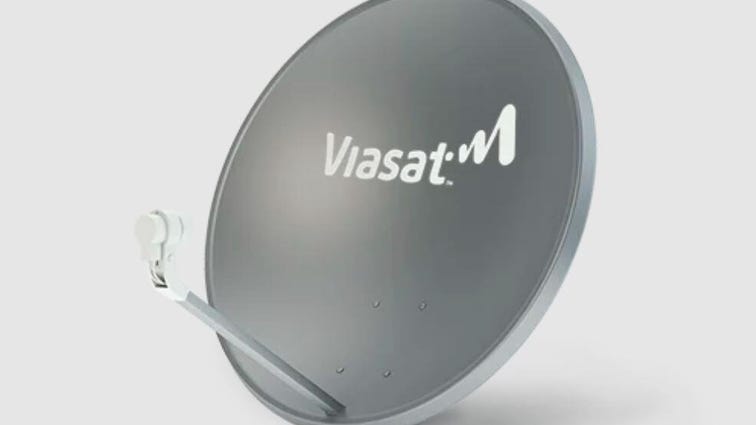Where Are You Most Likely to Find Satellite Providing Internet Access for Wireless Hotspots?
It's not breaking news that many in rural America lack adequate internet access. There's some disagreement on the exact numbers, but a growing chorus of voices agree the US has work to do to increase and expand its internet infrastructure. The good news? President Biden's infrastructure bill is signed and includes money to help bridge that digital divide.
In the meantime, satellite internet connection is the one broadband connection type currently available to people in the rural areas of all 50 states. It doesn't match the internet speed capabilities of fiber or cable connections. Still, when internet access is absolutely vital (and thepandemic has shed light on just how critical it is), satellite broadband can play a key role. But which of the satellite internet providers is the best?
Frankly, there aren't many choices out there. But here's what you'll find when you start to explore satellite internet access, starting with a quick look at how the best satellite internet providers compare.
Read more:Best rural internet providers of 2022
Satellite internet provider comparisons
| Provider | Download speeds | Upload speeds | Lowest monthly cost* | Regular monthly cost* | Contract terms | Equipment costs | Data allowance |
|---|---|---|---|---|---|---|---|
| HughesNet | 25Mbps | 3Mbps | $40-$130 | $60-$150 | Two years | $15 a month or $450 one-time purchase | 10-100GB |
| Viasat | 12-100Mbps | 3Mbps | $70-$200 | $100-$300 | Two years | $13 a month or $299 one-time purchase | 40-150GB |
| Starlink | 50-150Mbps | 20Mbps | $99 | $99 | None | $499 one-time purchase | Unlimited |
Let's dig a little deeper to see what each of the satellite internet providers brings to the table.
HughesNet: Best for speed reliability

HughesNet
HughesNet scores strong points for its consistency of internet service regarding download speed. Whereas other satellite internet providers' speeds might vary from location to location, HughesNet's max download speed -- though not as fast on the top end as others -- are available to all customers in all remote areas. What's more, in 2018, a Federal Communications Commission report on broadband noted that HughesNet fared best among all participating providers for delivering actual median download speed at 150% or higher of the advertised speed.
Things to consider? While HughesNet has no hard data limits, you'll find its speeds reduced to 1-3 megabits per second once you hit your monthly data allowance. HughesNet also came up short in J.D. Power's 2021 US Residential Internet Service Provider Satisfaction Study, landing dead last in the South region for overall customer satisfaction.
Read more on this provider in our HughesNet review.
HughesNet
HughesNet satellite internet plans
| Plan | Max download speeds | Max upload speeds | Starting monthly cost* | Regular monthly cost (after 6 months)* | Contract terms | Data allowance |
|---|---|---|---|---|---|---|
| HughesNet Gen5 | 25Mbps | 3Mbps | $40 | $60 | Two years | 10GB |
| HughesNet Gen5 | 25Mbps | 3Mbps | $50 | $70 | Two years | 20GB |
| HughesNet Gen5 | 25Mbps | 3Mbps | $80 | $100 | Two years | 30GB |
| HughesNet Gen5 | 25Mbps | 3Mbps | $130 | $150 | Two years | 50GB |
Viasat: Best for versatility of plans

Viasat
Viasat satellite internet lets you choose an internet plan that best fits your needs. Those internet service plans include some slower than what you'll find with HughesNet and several faster. Packages also come with more data -- up to 150GB -- though, similar to HughesNet, you may find your data "deprioritized" if you go over your monthly data allowance.
Viasat also flexes its versatility muscles with its satellite/DSL internet offering, Viasat Flex. This service, available at no extra cost to rural areas within AT&T's DSL network, aims to improve signal reliability and lower latency.
Finally, Viasat swerves once again when it comes to equipment. It used to be the case that Viasat didn't allow you to buy equipment. That might have seemed like a bonus when you consider that HughesNet charges $450 if you want to buy your gear (which includes installation costs) and Starlink devices currently cost $499 -- but that also meant you couldn't avoid the additional monthly equipment rental fee of $13. But now, you can buy your Viasat equipment for a one-time purchase of $299, which is cheaper than its rivals.
Read more about Viasat.
Viasat
Viasat internet plans and pricing
| Plan | Max download speeds | Max upload speeds | Starting monthly cost* | Regular monthly cost (after 3 months)* | Contract terms | Data allowance |
|---|---|---|---|---|---|---|
| Unlimited Bronze 12 | 12Mbps | 3Mbps | $70 | $100 | Two years | 40GB |
| Unlimited Silver 25 | 25Mbps | 3Mbps | $100 | $150 | Two years | 60GB |
| Unlimited Gold 50 | 50Mbps | 3Mbps | $150 | $200 | Two years | 100GB |
| Unlimited Platinum 100 | 100Mbps | 3Mbps | $200 | $300 | Two years | 150GB |
Starlink: Best potential

John Kim/CNET
When eccentric billionaire Elon Musk isn't garnering headlines as Time's Person of the Year for 2021 or asking on Twitter whether he should sell Tesla stock to pay taxes, he's making some noteworthy progress with his Starlink satellite internet project. Granted, this satellite provider is still in the early stages -- there's a waiting list at present and currently just over 100,000 active users -- but the early results, as shared by our own John Kim, are promising.
First, at 150Mbps, the max download speeds are higher than those offered by HughesNet and Viasat. In fact, Musk boasted in February that Starlink should be able to hit speeds closer to 300Mbps within a year. It also features a latency between 20 to 50 milliseconds compared to the more typical range of 450-700ms for HughesNet and Viasat.
Second, Starlink will keep things as simple as possible by going with only one satellite internet plan offering a satellite dish and router for an internet signal. In April, SpaceX President Gwynne Shotwell said there are "no plans" to introduce tiered pricing or packages.
Lastly, while the current equipment fee of $499 is steeper than those charged by either HughesNet or Viasat, Starlink does not require a two-year contract and features genuinely unlimited data. Once you consider the decent upload speed, these are pretty considerable upgrades for anyone stuck with satellite internet. Those facts could undoubtedly change as Starlink continues to grow, but they're intriguing aspects of the pitch that could help set it apart from the competition.
Read our hands-on experience with Starlink.
Starlink satellite internet
| Plan | Max download speeds | Max upload speeds | Starting monthly cost* | Regular monthly cost (after 3 months)* | Contract terms | Data allowance |
|---|---|---|---|---|---|---|
| Starlink | 150Mbps | 20Mbps | $99 | $99 | None | Unlimited |

Now playing: Watch this: Testing out SpaceX Starlink satellite internet
12:32
What's on the horizon for satellite internet providers?
Stay tuned to CNET for the latest developments with Starlink as it presses further into its plans and aims to expand its coverage.
But it should also be mentioned that further disruption may come from another multibillionaire, Jeff Bezos, as Amazon's Project Kuiper also aims to enter the field. While nowhere near the stage that Starlink has achieved thus far, Project Kuiper did turn some heads when its prototype delivered speeds up to 400Mbps in recent iterations.
Innovations from low Earth orbit satellites will be just one piece of the puzzle of better delivering the internet option to the millions of households still unable to find a reliable broadband source. We'll keep this post updated as your options (hopefully) improve.
Best satellite internet providers FAQs
Is Starlink better than Viasat?
Potentially, yes. If you are one of the 100,000 or so current users of Starlink internet service, then you're experiencing a broadband connection with higher maximum download and upload speeds than Viasat (150Mbps/20Mbps to 100Mbps/3Mbps). Starlink also has lower latency than Viasat (20-50ms vs. 450-700ms), making gaming and other online activities that require fast response times much more feasible on Starlink than Viasat.
That said, there are more than 500,000 potential customers still waiting to try Starlink. If you hop on the site now and try to get in line, you'll be met with a message that the earliest availability is "early to mid-2022." That's remarkably unhelpful for the 14 million or so Americans still without access to broadband service, per the FCC's most recent reports.
So, where Viasat wins is its availability to over 120 million households in the US, right now. Suppose you're in a rural or underserved area with few options for internet connectivity. In that case, Viasat can get you connected, whereas Starlink may be an option down the road but it's not an immediate solution.
Do all satellite internet providers have data caps?
Technically, none of them do. Both HughesNet and Viasat claim to offer "unlimited data" -- mainly because neither charges overage fees -- but each has a set data limit for its plans. If you hit that data limit before the end of the month, there won't be monetary penalties, but you will experience much slower, throttled speeds for the remainder of that month. So your data may not be capped, but I would certainly call that practice limiting.
On the other hand, Starlink offers truly unlimited data. There's only one plan offered and no set data cap number, after which it can begin to throttle or slow your internet speed. That's a significant advantage as more Americans are working from home.
Will Starlink be faster than HughesNet?
Yes. Starlink claims that customers can expect download speeds from 50-150Mbps. CNET's John Kim has tested the service and experienced average download speeds of around 78Mbps. HughesNet, which relies on satellites in a much higher orbit than that Starlink uses -- which means data takes a little longer to travel back and forth -- offers plans with maximum download speeds of 25Mbps. That's faster than some of the plans available with Viasat but not a match for Starlink.
Where Are You Most Likely to Find Satellite Providing Internet Access for Wireless Hotspots?
Source: https://www.cnet.com/home/internet/best-satellite-internet/
0 Response to "Where Are You Most Likely to Find Satellite Providing Internet Access for Wireless Hotspots?"
ارسال یک نظر